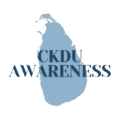FAQ
- CKDu stands for Chronic Kidney Disease of Unknown etiology. It’s a progressive kidney condition where the cause is not clearly understood.
- Early stages may not show noticeable symptoms. As it progresses, symptoms like fatigue, swelling in extremities, foamy urine, decreased appetite, and difficulty concentrating may appear.
- The exact cause is unclear, but it’s associated with factors like agricultural work (especially in hot climates), dehydration, exposure to heavy metals, pesticides, and other environmental toxins.
- No, CKDu is not contagious. It’s a non-communicable disease that develops over time due to various risk factors.
- Agricultural workers, especially in regions with high heat and exposure to certain chemicals, are at higher risk. Individuals with a family history of kidney disease or those with conditions like diabetes and hypertension are also more susceptible.
- Diagnosis involves a combination of medical history review, physical examination, blood tests (creatinine levels, glomerular filtration rate), urine tests (proteinuria), imaging tests (ultrasound, CT scans), and sometimes a kidney biopsy.
- Availability of cures depends on what caised CKDu. In most cases, there’s no cure for CKDu, but there are many treatment options. Treatment focuses on managing symptoms, slowing disease progression, and addressing complications like high blood pressure and anemia.
- Treatment may include lifestyle changes (dietary modifications, exercise), medications to control blood pressure and manage complications, dialysis in advanced stages, and ultimately, kidney transplant in end-stage CKDu.
- Prevention involves avoiding or minimizing exposure to potential risk factors like extreme heat, dehydration, heavy metals, and agricultural chemicals. Managing underlying conditions like diabetes and hypertension is also crucial.
- Ongoing research aims to better understand the causes of CKDu, improve early detection methods, develop targeted therapies, and implement preventive measures, especially in high-risk populations.
- Sri Lanka has implemented various measures to address CKDu, including public health campaigns to raise awareness, initiatives to improve working conditions for agricultural workers, research efforts to understand the disease’s causes better, and healthcare interventions to manage and prevent CKDu.
- Individuals can seek support and information from healthcare providers, local health authorities, community health centers, patient advocacy groups, and reputable online resources specific to CKDu in Sri Lanka.
- The Sri Lankan government has implemented various policies and programs to address CKDu’s impact, including healthcare services, occupational safety regulations, research funding, and community outreach initiatives to promote kidney health and well-being.
- Yes, dietary recommendations for CKDu patients in Sri Lanka often include reducing salt intake, limiting protein consumption, avoiding foods high in potassium and phosphorus, and maintaining a balanced diet with emphasis on fruits, vegetables, and whole grains.
- CKDu can have significant socioeconomic implications in Sri Lanka, particularly in rural agricultural areas where it is prevalent. The disease can lead to reduced productivity, increased healthcare costs, and financial strain on affected individuals and their families.
- Challenges in managing CKDu patients in Sri Lanka’s healthcare system include limited access to specialized care in rural areas, the high cost of dialysis and kidney transplant services, shortages of trained healthcare professionals, and the need for sustainable long-term management strategies.
- Yes, Sri Lanka has implemented environmental initiatives to reduce CKDu risk factors, including regulations on agrochemical use, promoting organic farming practices, conducting awareness campaigns on safe handling of chemicals, and monitoring water quality in affected regions.
- CKDu can disproportionately affect vulnerable populations like women and children in Sri Lanka. Women may face additional burdens due to caregiving responsibilities for family members with CKDu, while children may experience health impacts from exposure to environmental toxins.
- Yes, Sri Lanka collaborates with international organizations, research institutions, and donor agencies to address CKDu comprehensively. This collaboration includes sharing data, research findings, best practices, and receiving technical support for healthcare interventions.
- Community-based organizations (CBOs) play a vital role in CKDu awareness campaigns, providing support services, advocating for policy changes, and fostering community engagement in preventive measures and healthcare access for CKDu patients in Sri Lanka.
- Individuals and communities can contribute by promoting health education, adopting sustainable agricultural practices, supporting local initiatives for clean water and environmental conservation, advocating for healthcare resources, and participating in research and data collection efforts.
